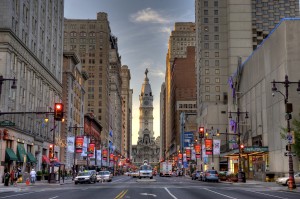For this post-valentine’s week blog, I am going to discuss the city of love. That is brotherly love of course. Philadelphia Pennsylvania, the city of brotherly love is perhaps the most historic city in America. It was the birthplace of the American Revolution, serving as the meeting place for both the signers of the Declaration of Independence and the writers of the Constitution as well as the new nation’s capital. Philadelphia is also a city of first. The first library, the first hospital, the first business and medical schools, the first national bank, and the first commodity and stock exchanges were all established in the city. Although these facts alone qualify Philadelphia for a special distinction among American cities, its intriguing and nuanced history place it on an even higher level.
In 1681 King Charles II of England had a debt problem. He owed William Penn the son of deceased Admiral and Parliament Member Sir William Penn a great deal of money but didn’t have enough reserves in his treasury to pay off the debt. However, the King did have millions of acres of American land at his disposal. So to pay off his debt the King gave William Penn a Royal Charter for the land west of the Delaware River. William Penn, a devout member of persecuted Quaker faith, was more than happy to accept this deal. Soon after Penn and his Quaker followers set sail for what he called Pennsylvania, a combination of his family name and the Latin word for woods.
Penn landed near the confluence of the Delaware and Schuylkill Rivers. Unlike previous European settlers Penn made a treaty with the local Delaware Native America tribe and paid for the land he and his followers would settle. Penn then set out to build a capital for his new settlement. He named this capital Philadelphia after the biblical Greek colony, whose name meant city of brotherly love. Penn wanted Philadelphia to be utopia based on the Quaker principles of intellectualism and openness. Penn declared religious and political freedom the law of the land. Unique ideas at the time but concepts that would eventual became the core values of a nation.
As tensions between the American Colonist and British Empire escalated in the early 1770s, colonial leaders decided to start meeting in what was now the largest and most important city in North American. These meetings organized by Philadelphia’s most prominent citizen, Benjamin Franklin, would eventually give rise to the United States’ founding documents that were without question highly influenced by the city’s progressive ideals. In the United States’ earliest years Philadelphia was the nation’s capital with all three branches of the federal government being housed in the Old Pennsylvania State House (aka Independence Hall). Although the Capital was moved to the newly constructed city of Washington D.C. in 1800, Philadelphia remained paramount in American society.
Throughout the ninetieth and twentieth centuries Philadelphia was an industrial powerhouse and transportation hub. The city became the destination of hundreds of thousands of German, Irish, Italian, and Jewish Immigrants. During the great migration of the 1920s Philadelphia also became the main destination of African American’s fleeing discrimination and poverty in the Deep South. The post-World War II years saw a great shift in the greater Philadelphia region as the majority of the city’s middle and upper class residents relocated to suburbs in Montgomery, Delaware, and Bucks counties. Consequently, Philadelphia slipped into a period of unprecedented urban decline.
Nonetheless beginning in the 1980s a renaissance swept the city. Gentrification began revitalizing decaying neighborhoods. Leading hospitals like the University of Pennsylvania Hospital, Thomas Jefferson University Hospital, and the Children’s Hospital of Philadelphia created new economic opportunities. Museums like the Franklin Institute and Philadelphia Art Museum and sport teams like the Phillies baseball team and Eagles football team have also reinvigorated the city’s culture. Today Philadelphia is once again on the path to prosperity with perhaps the most loyal and outspoken citizenry in the country. So next time you want to experience American history first hand or just need some brotherly love Philly has got you covered.

Having never been and always wanted to visit the city, just reading your blog makes me want to go to Philadelphia even more. Its rich history is a deep calling for me and it just seems like a city I could love.
I love Rob’s commentary on Boston, what a Bean-Towner. Anyway, Philadelphia is one of my favorite cities I’ve been to and I think that its rich history is truly remarkable. It’s crazy to think that you can stand on the same streets as Ben Franklin, Thomas Jefferson, and even George Washington in the same place where history was made (and Nicolas Cage made National Treasure). And, as a Pittsburgher, I hold no grudge against the city, because Philadelphia is a Greek name and they have awesome cheesesteaks.
As a Bay Stater, I am very offended that you would claim that Philadelphia is the birthplace of the American Revolution. They just signed a document in Philly. The Greater Boston Area has the Boston Massacre, the Intolerable Acts, the Boston Tea Party, Paul Revere’s Midnight Ride and the first battle in the war! Despite this oversight, your blog was very entertaining. I didn’t know the history behind how William Penn ended up with a colony.
Well, clearly I’m partial to the city of Philadelphia. As you said, it’s a city of rich history, and was incredibly prominent during the early formation of our nation. Although Philly fans may be quite obnoxious and eccentric, you can’t deny we’ve got pride. Nice work
I am whole heartedly in love with the city of Philadelphia. I have only been there once, but I enjoyed everything that I had to offer- from Independence Hall to the Reading Terminal Market. If also appreciate you discussing the history of its establishment! I had no idea how Pennsylvania was established or how Philly got its name. Thanks Jack! This was the best post yet.